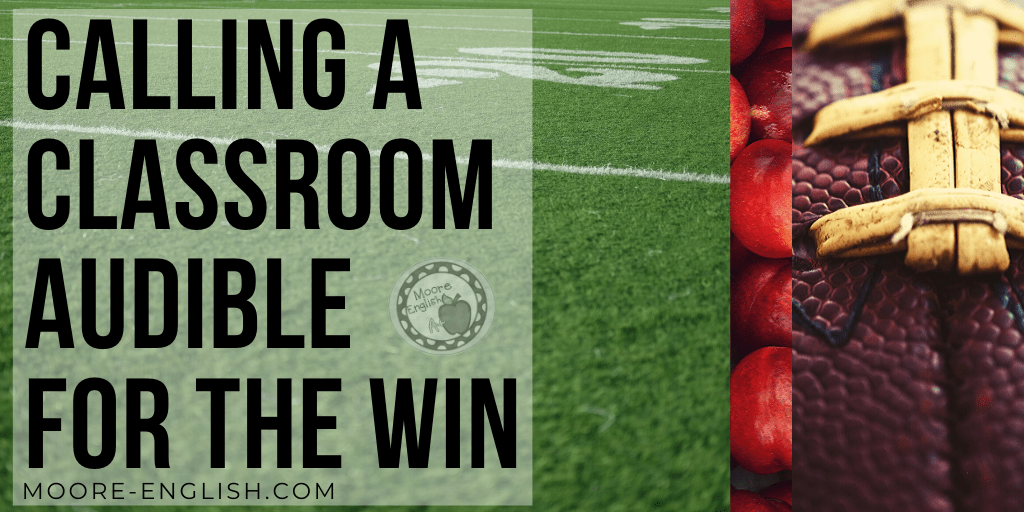This is supposed to be a post about teaching irony, but yesterday at school, our wifi went down. And it stayed down. Despite the hang up, my classes rolled on–we adapted, we flip flopped plans, and we adjusted. I was still able to lead productive classes without Internet access. However, I had numerous students tell me their other classes had been like study halls. So I started to wonder, “What needs to be in place for a teacher to successfully call a classroom audible?” To answer that question, I made a list of the conditions in which teachers may need to call an audible. And then I considered how I prepare for such situations.
This post this post may contain affiliate links. Please read the Terms of Use.
When to Call an Audible
In my town, high school and college sports are a way of life. During March, this pays off because I can use brackets for to promote student engagement. And during the fall, I can explain to students that I’m calling an audible, and they mostly understand my meaning. Here are a couple ways teachers know it’s time to call an audible:
External Pressures: This is what happened yesterday when my school lost wifi. Last year, we had a pipe explode that caused us to have an early release. Teachers also run into snow days, late busses, surprise drills, assemblies that run long, lice checks, senior picture day, and a million other reasons to abruptly alter plans on the fly.
Emergency Pressures: While teachers can prepare for some interruptions, sometimes health and family also create emergency situations. In these situations, the best defense is a good offense. So having emergency sub plans ready to go is a life saver!
Internal Pressures: Sometimes, though, the wifi works, the bells are ringing on schedule, the trains are leaving the station, and you still need to call an audible. For me, this usually happens when I start collecting formative data that suggests my students are not ready for a new lesson, concept, or activity.
Call It
There’s no shame in changing your plans. Somethings are truly out of our hands. And sometimes calling an audible to reteach, restructure, or regroup is best for your students. Ignoring the signs that it’s time to make a change is far more dangerous than flipping your plans on the fly. When teachers ignore signs that it’s time to adapt, they run into classroom management problems. Then they get frustrated, students get frustrated, and we lose any chance at growth or learning. With this in mind, here are some keys to making sure you are ready to call an audible.
Classroom Procedures: Regardless of the force necessitating a course correction, classroom procedures provide teachers with the stability to make a change without faltering. When the wifi went out, I had to scrape my introductory lesson on context clues, which relies on a video. However, I had classroom procedures and expectations established for sustained silent reading, so I was able to fall back on this routine.
Desired Results: In the classroom, procedures provide stability. Teachers have a vision of how students should behave in the classroom. And procedures and expectations get students to that vision. In lesson planning, desired results have the same effect. Teachers know where they want students to be at the end of a week, unit, quarter, etc. When pressures arise that cause a teacher to need to call an audible, keeping the endgame in mind can help teachers avoid an interception. When the wifi went out, I considered where students needed to be in two weeks. I began mentally swapping out technology-rich activities for ones that could happen without Google Classroom. Here are some favorite activities that require little prep but still make for meaningful lessons:
- Literary Devices BINGO
- First Impressions Book Reviews
- Grammar and Vocabulary Games
- Pre-Read Nonfiction and Informational Texts
- Word Profile Vocabulary Graphic Organizers (freebie!)
- Task Cards for Poetry, Rhetoric, Informative Texts, Research, Characterization, and Plot Conflict
Sponge Activities: Sometimes you can be planned to the gills, have procedures, and the lesson still goes off the rails. When this happens, I turn to sponge activities. Teachers can use sponge activities at any time. Ideally, teachers save them for the 10-odd minutes at the end of a period. But in a pinch, a sponge activity can become the lesson. Some of my favorite sponge activities include journaling, task cards, and grammar games.
Epilogue: An Audible for the Win
At the end of the day, an audible may not be a teacher’s first choice for a given lesson. But it may be the play that wins the game. If it does, that’s great. And if it doesn’t, there’s always tomorrow. Regroup. Refocus. Reflect. Figure out what kind of pressure caused the hang up, and readjust your sails. You will get to your blog post about irony eventually. But sometimes the wifi goes out, and writing about that is a richer opportunity. What opportunities can you find in deciding to call an audible? Let us know in the comments.


Photos by Dave Adamson and Andrew McElroy on Unsplash






